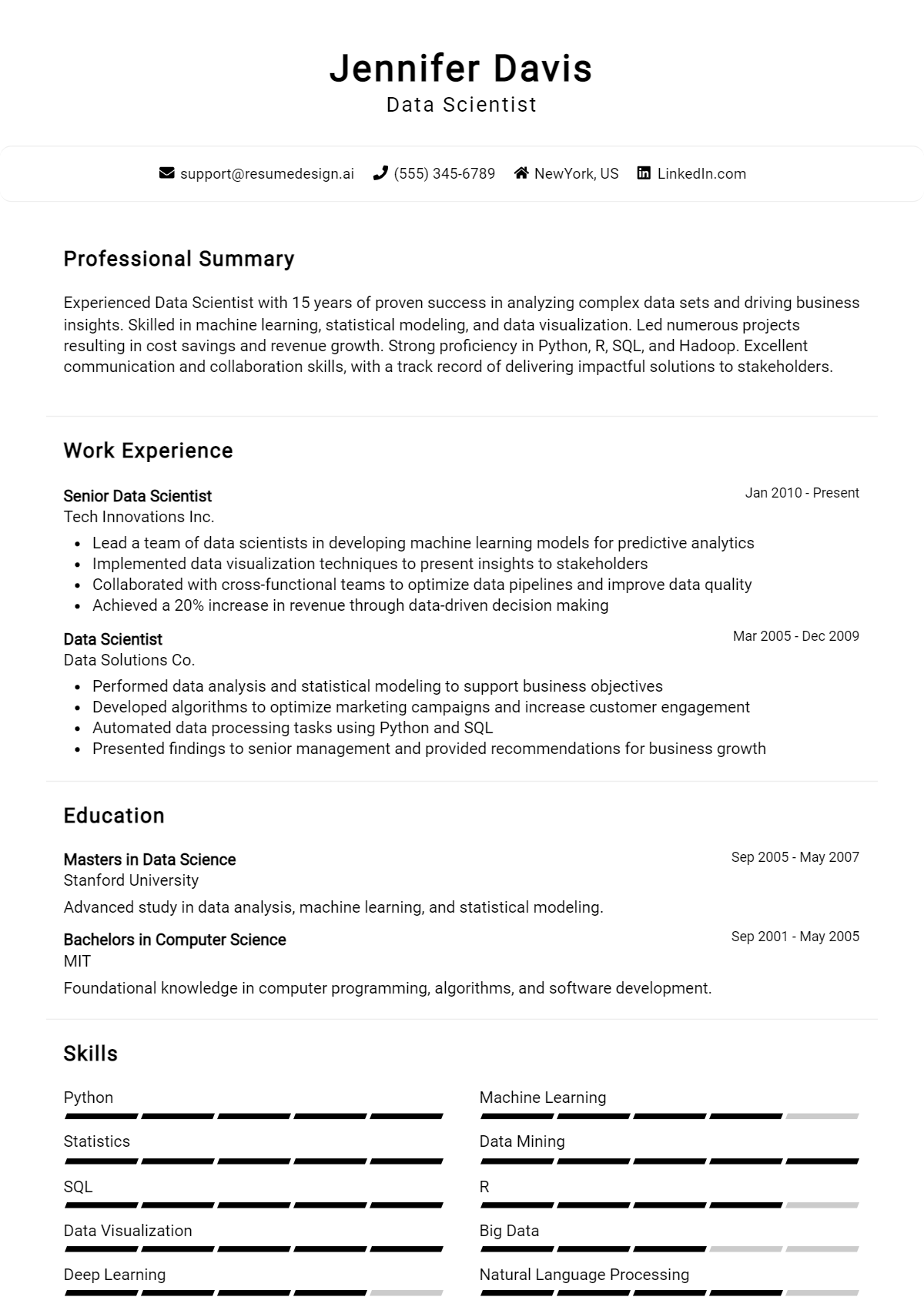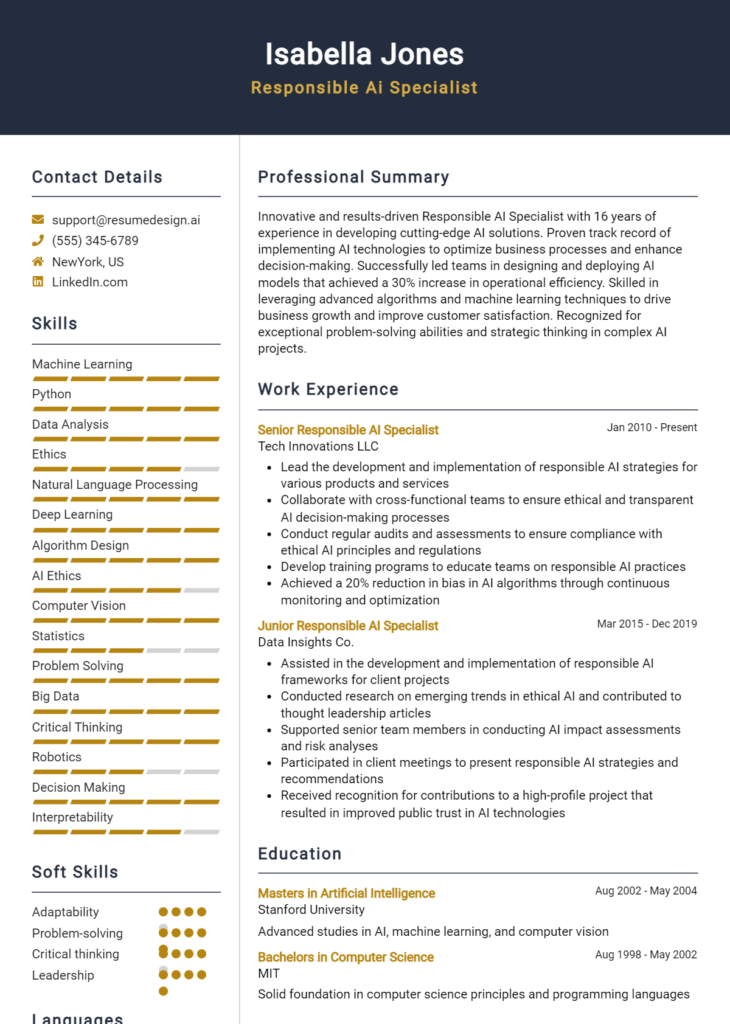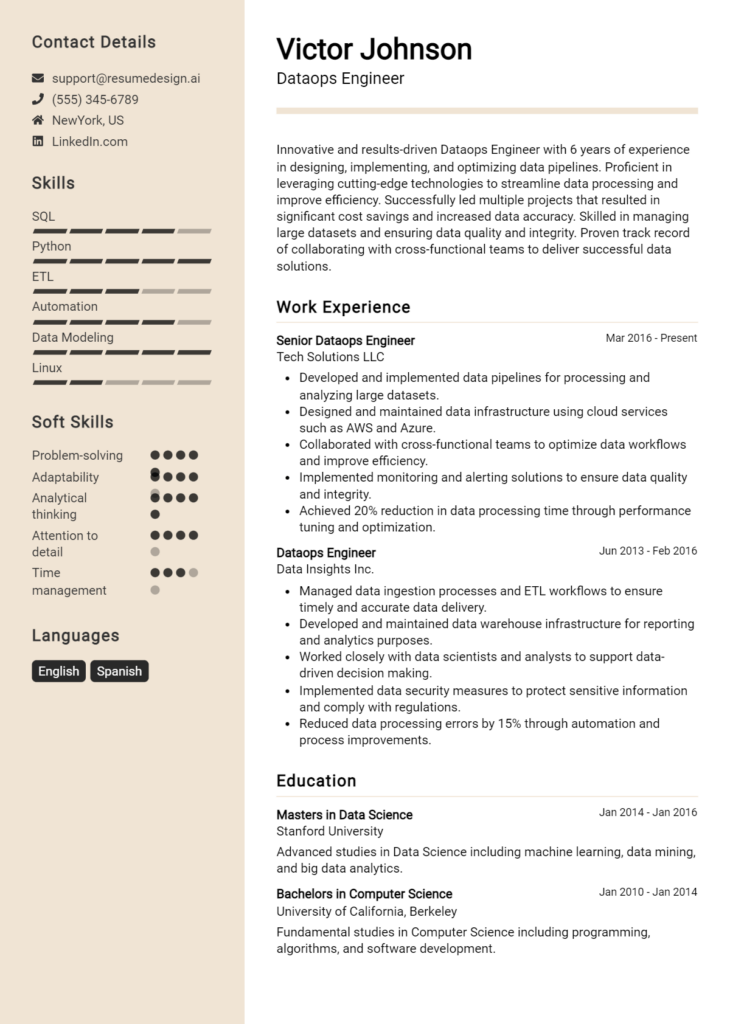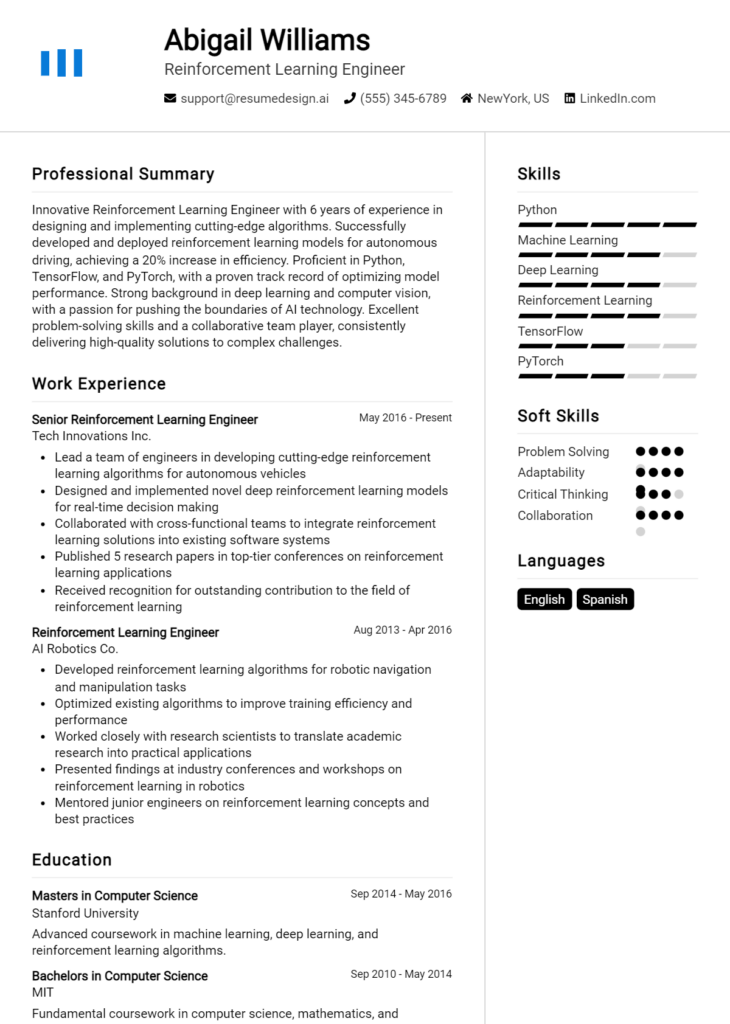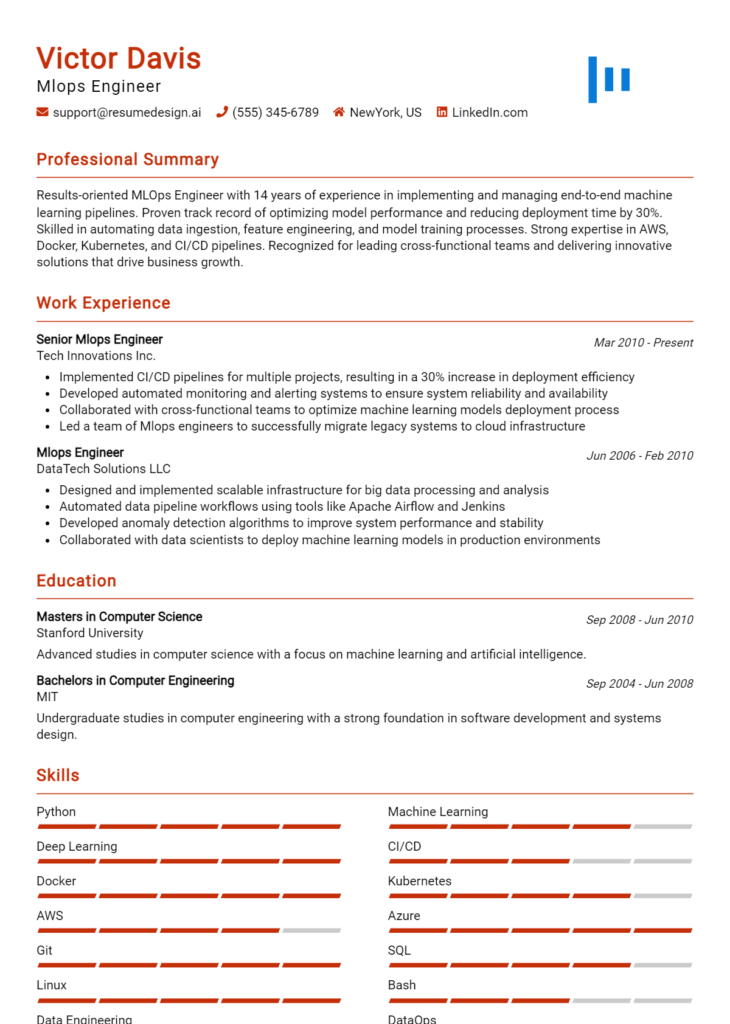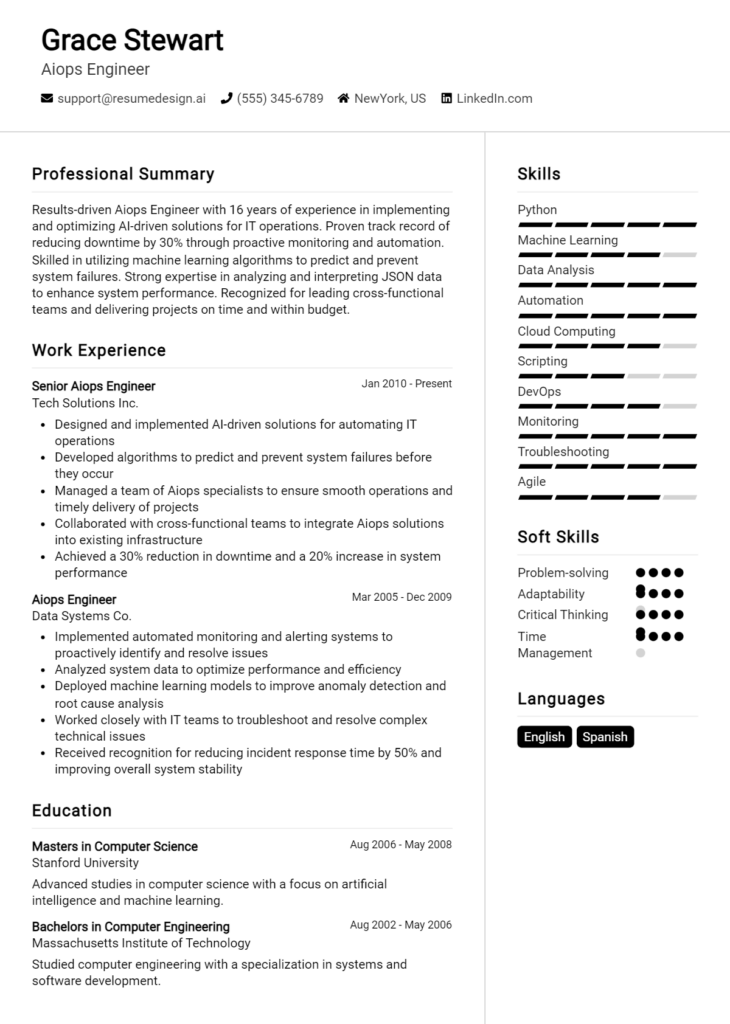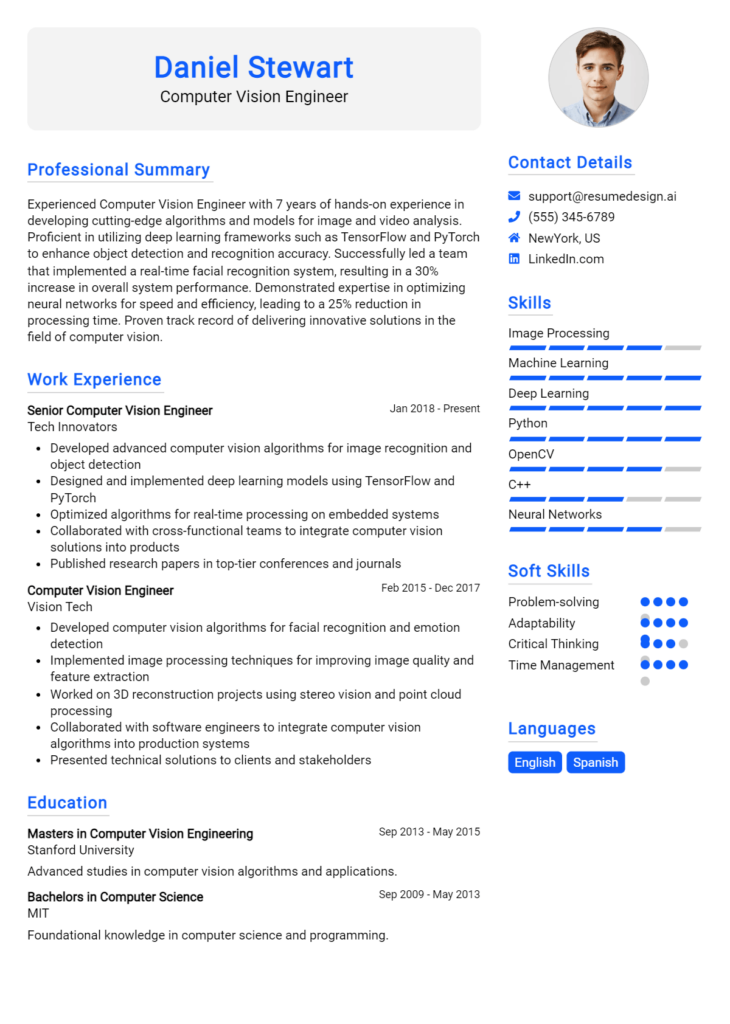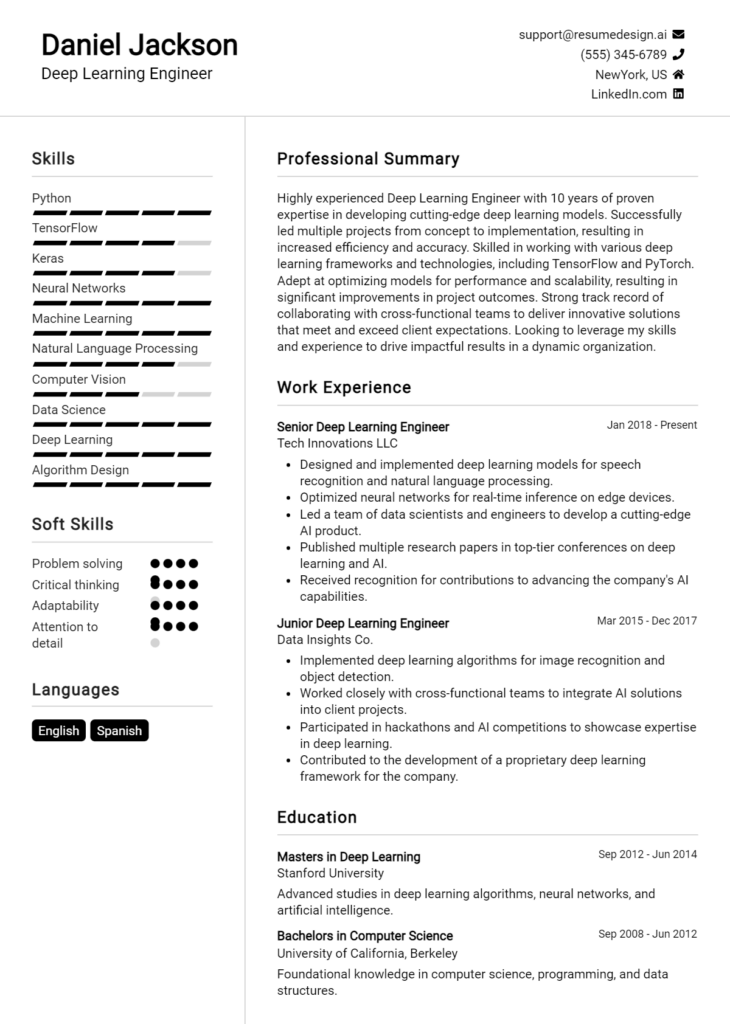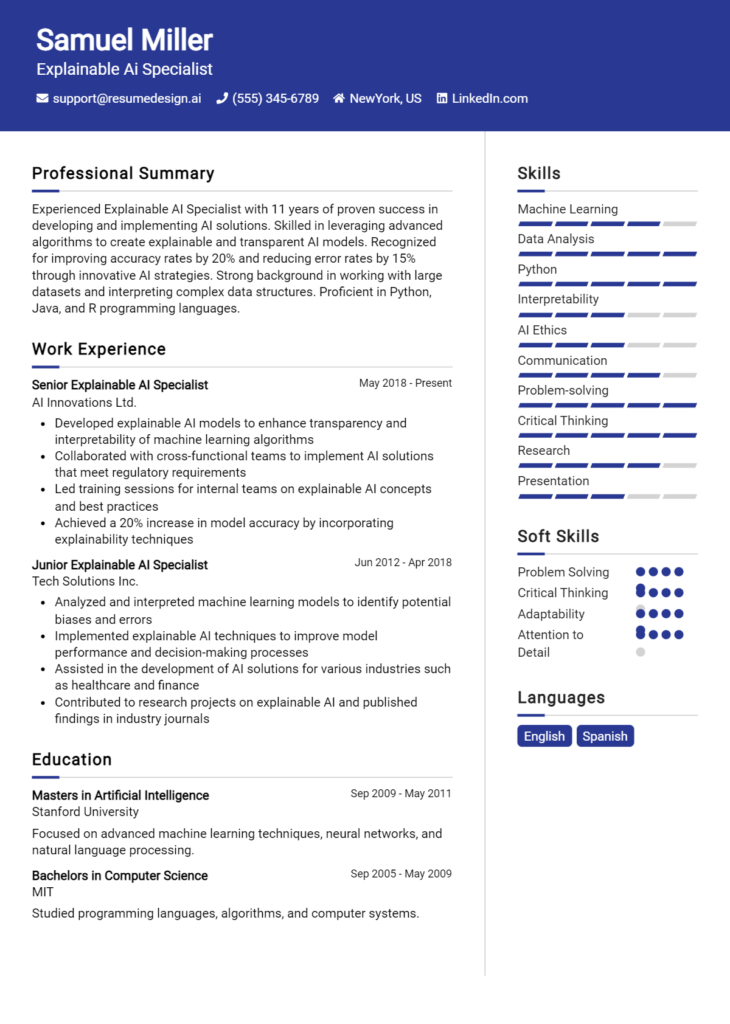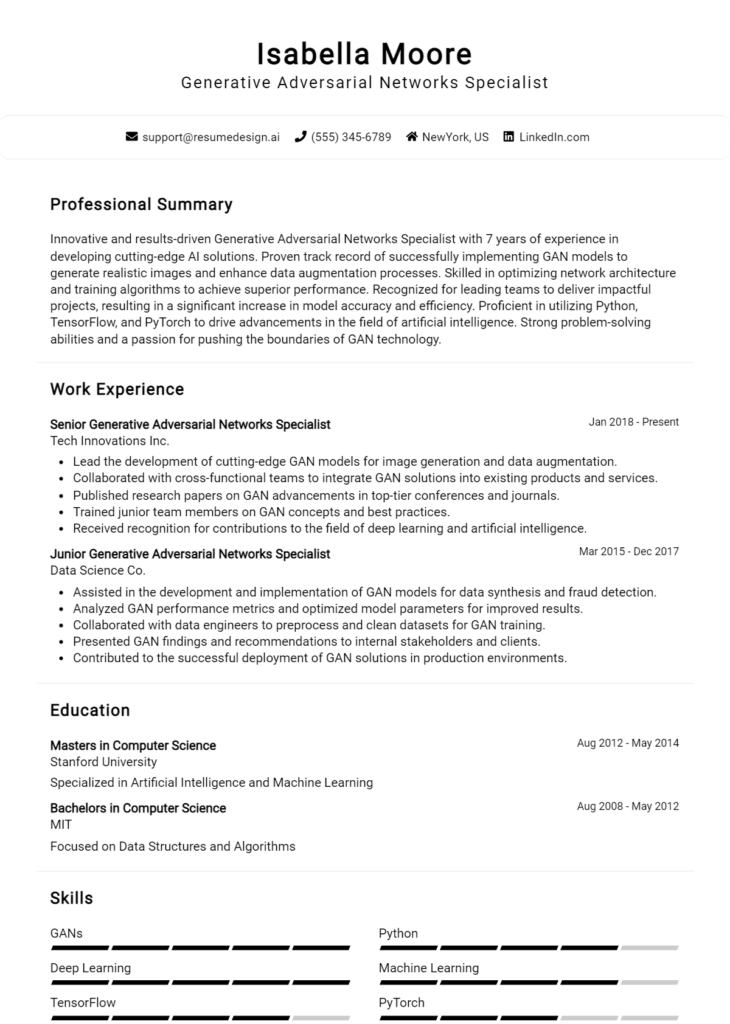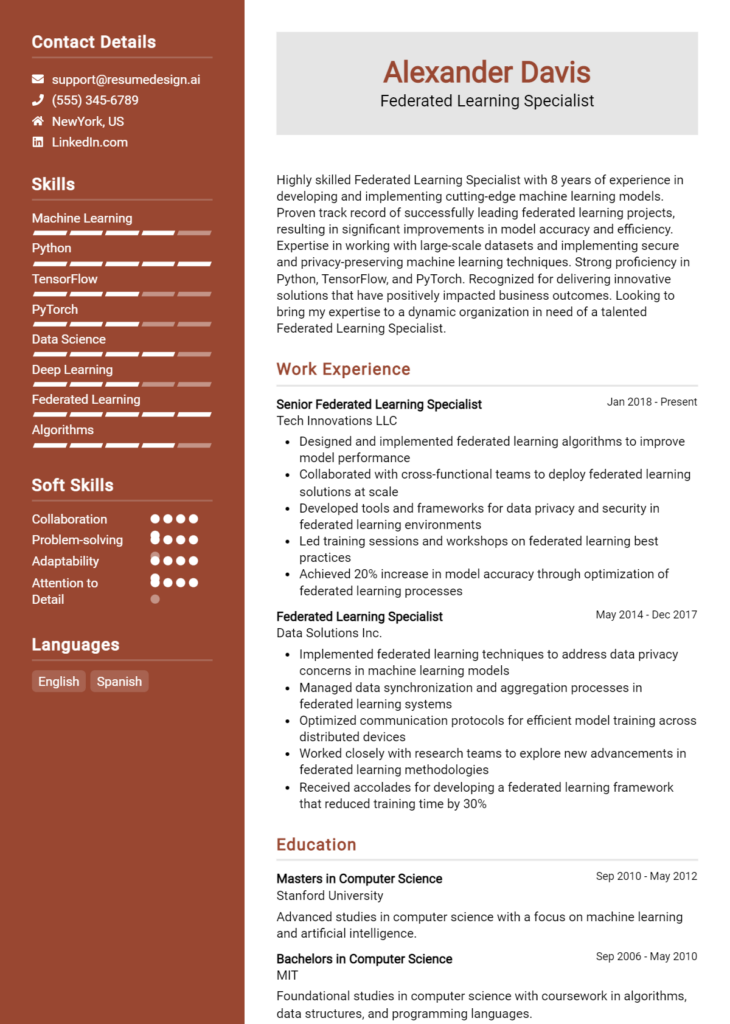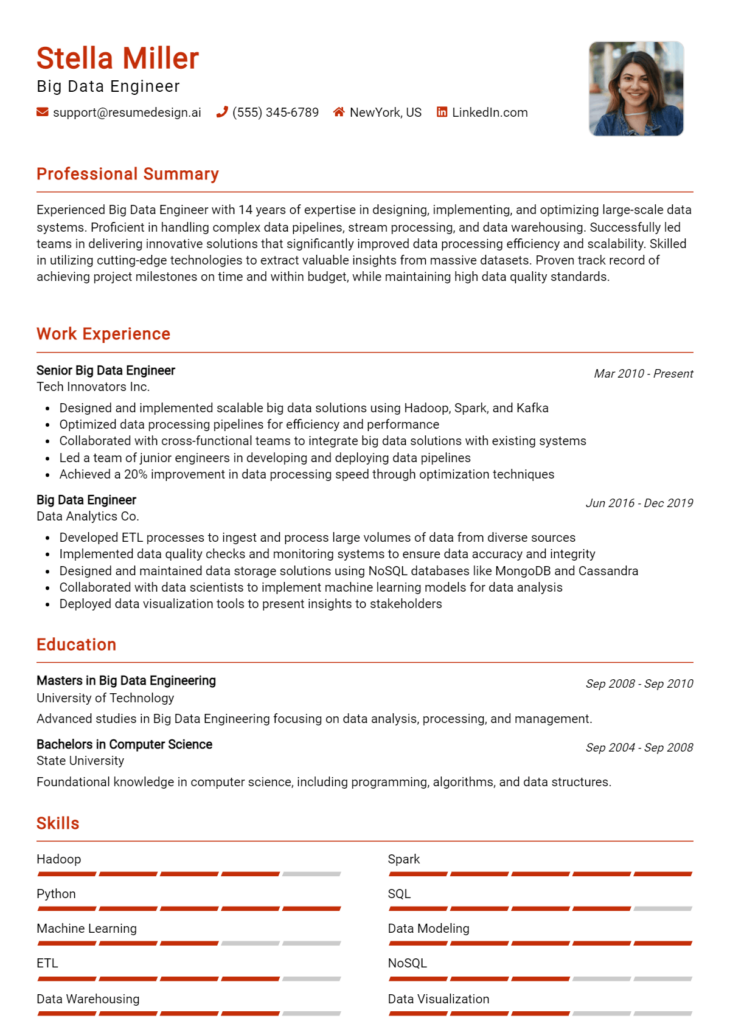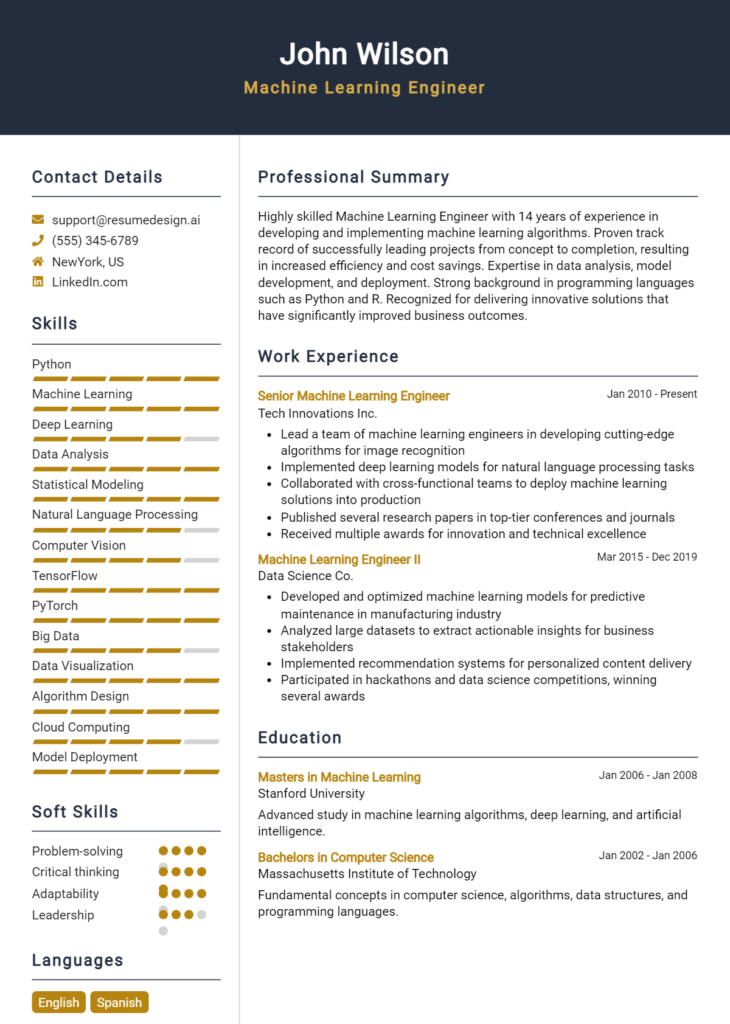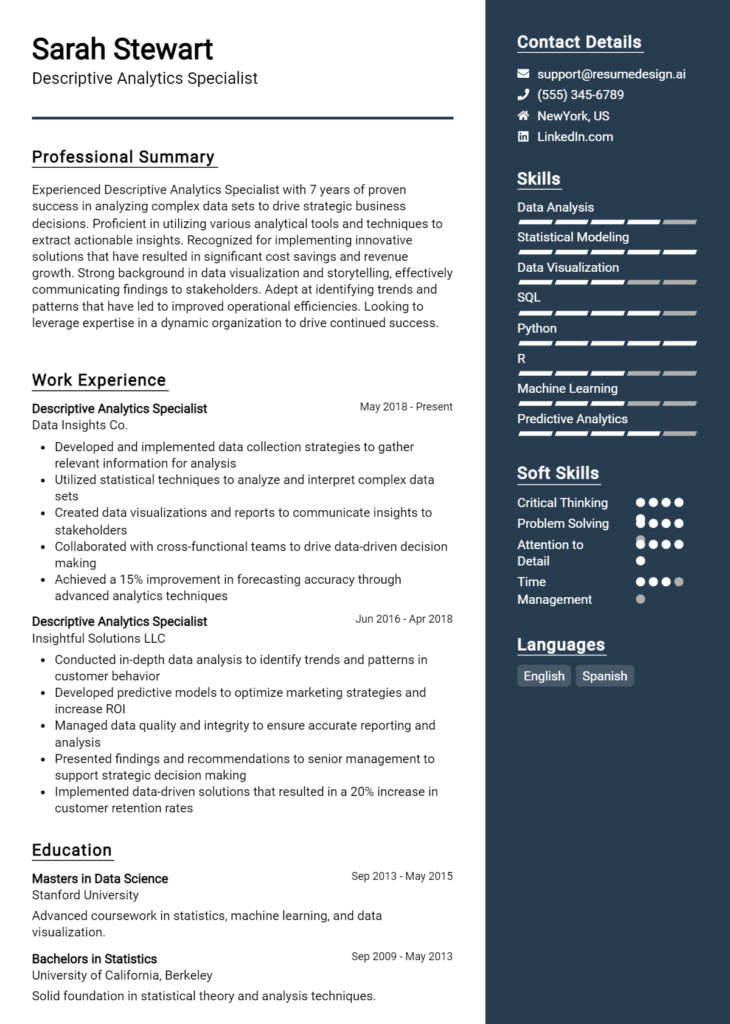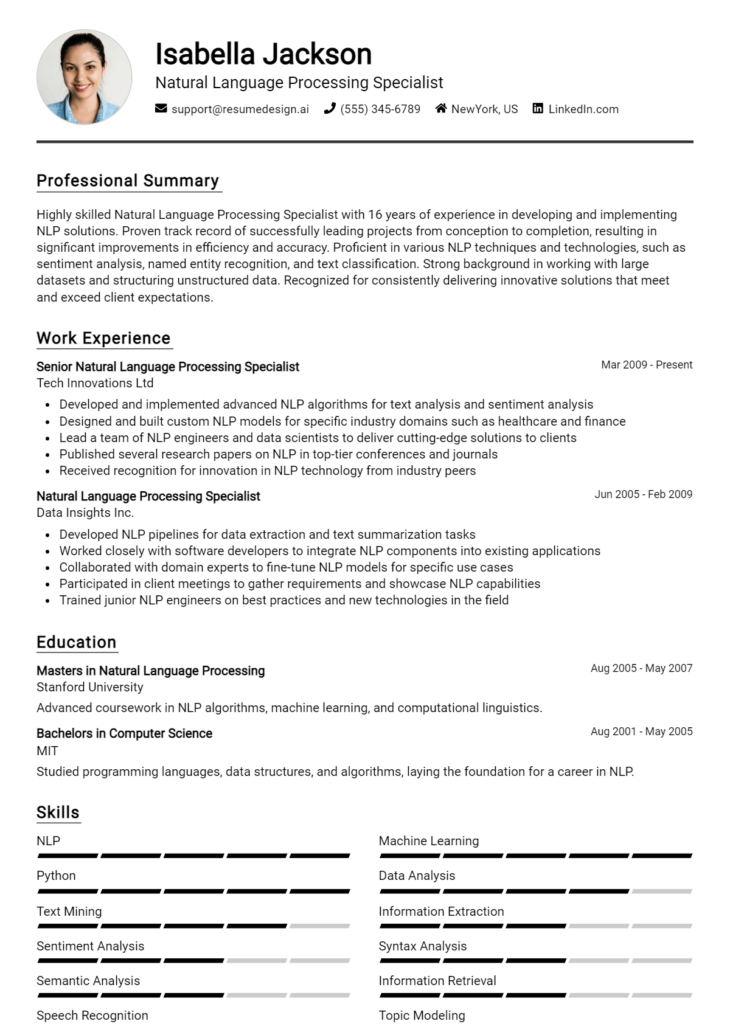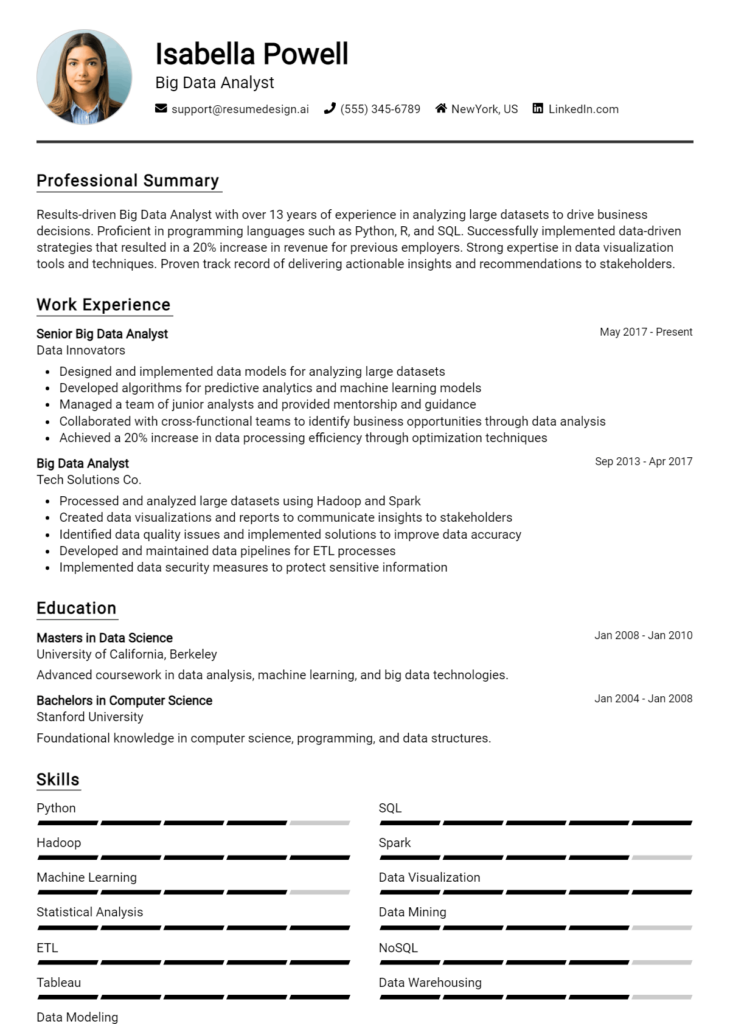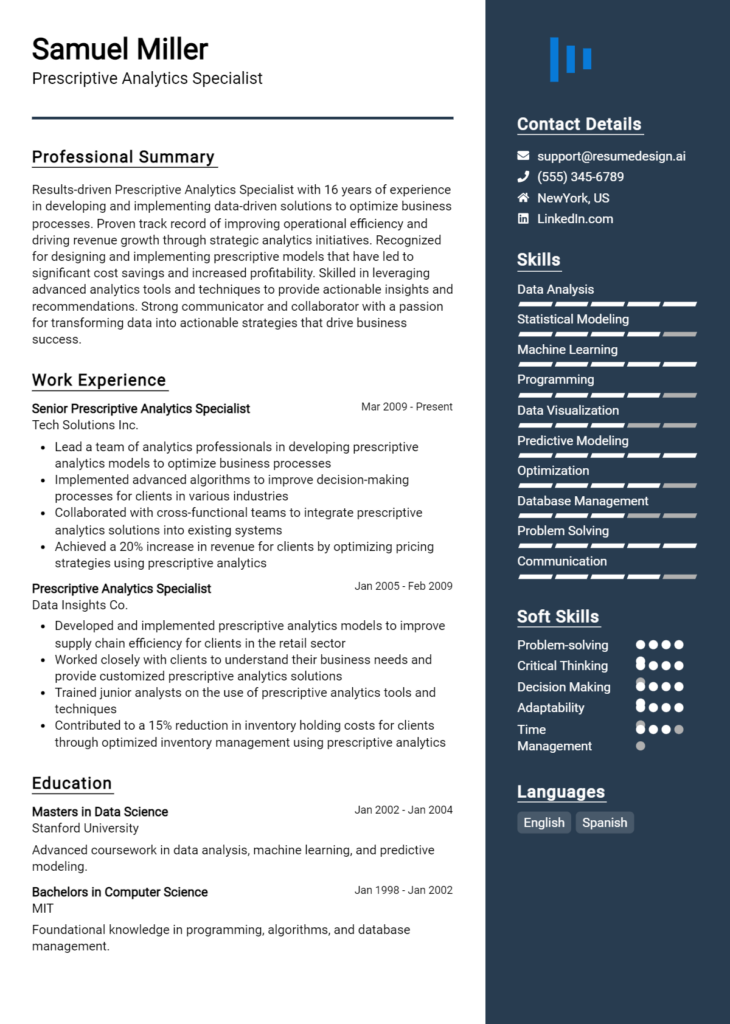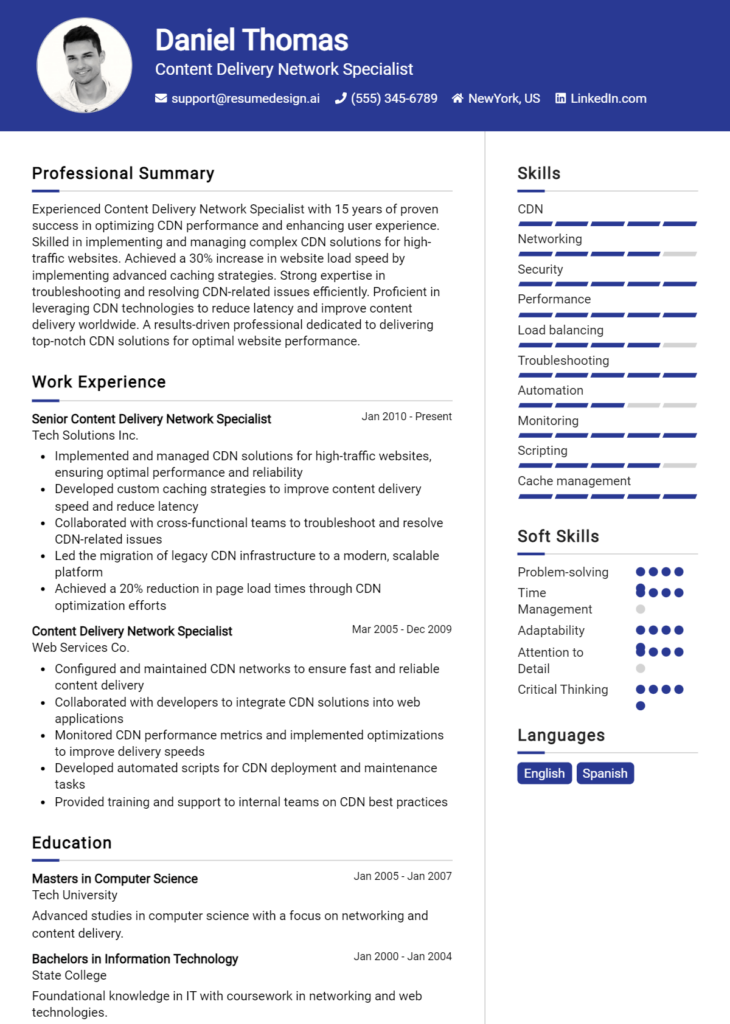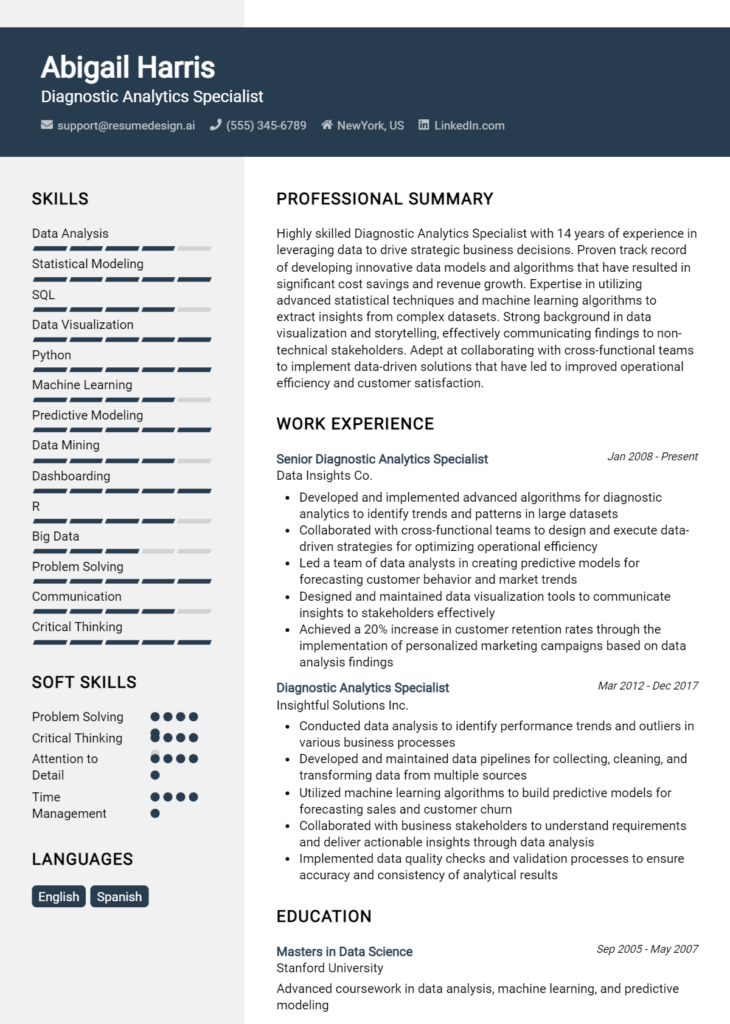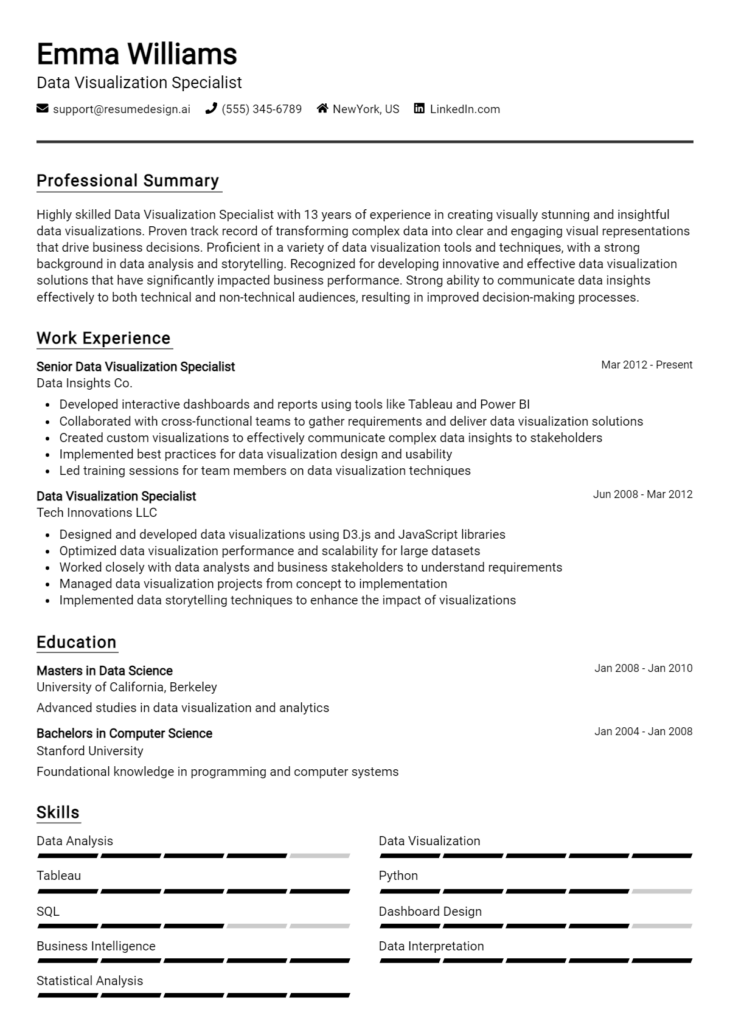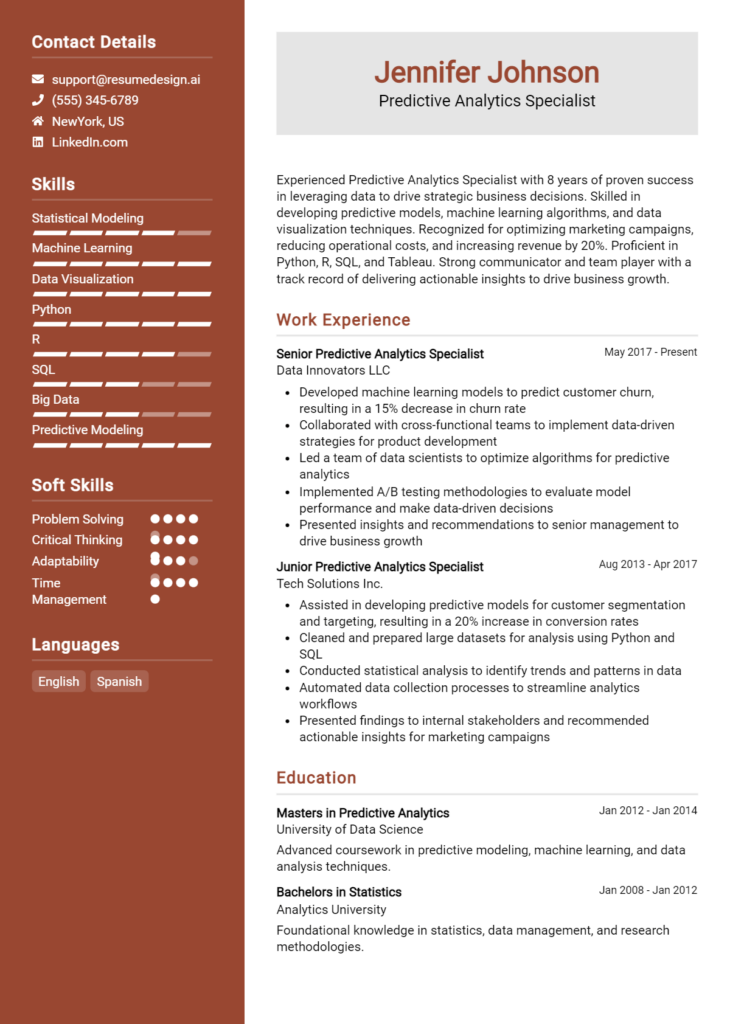Data Scientist Core Responsibilities
A Data Scientist plays a pivotal role in synthesizing complex data into actionable insights, bridging the gap between technical and operational departments. Key responsibilities include data analysis, statistical modeling, and machine learning implementation, requiring strong problem-solving skills and proficiency in programming languages like Python and R. Effective communication is essential for collaborating with cross-functional teams and aligning data-driven strategies with organizational goals. A well-structured resume can effectively highlight these technical, analytical, and operational abilities, showcasing a candidate's potential value.
Common Responsibilities Listed on Data Scientist Resume
- Collecting, cleaning, and preprocessing large datasets.
- Developing predictive models and algorithms.
- Performing exploratory data analysis to uncover trends.
- Collaborating with stakeholders to understand business requirements.
- Visualizing data findings using tools like Tableau or Matplotlib.
- Conducting A/B testing and analyzing results.
- Presenting data-driven insights to non-technical audiences.
- Staying current with industry trends and emerging technologies.
- Automating data collection processes and reporting.
- Ensuring data integrity and security throughout analysis.
- Contributing to the design of data architecture and pipelines.
- Mentoring junior data team members and promoting best practices.
High-Level Resume Tips for Data Scientist Professionals
A well-crafted resume is essential for Data Scientist professionals, serving as the first impression a candidate makes on a potential employer. In a competitive job market, your resume must not only highlight your technical skills but also reflect your achievements and problem-solving capabilities. It needs to effectively communicate your ability to derive insights from data and contribute to business objectives. This guide aims to provide practical and actionable resume tips specifically tailored for Data Scientist professionals, helping you stand out in a sea of applicants.
Top Resume Tips for Data Scientist Professionals
- Tailor your resume to each job description by incorporating relevant keywords and phrases from the posting.
- Highlight your technical skills prominently, including programming languages (Python, R), data visualization tools (Tableau, Power BI), and machine learning frameworks (TensorFlow, scikit-learn).
- Showcase relevant experience by detailing your roles in past projects, including your contributions and specific tools used.
- Quantify your achievements with metrics, such as percentage improvements in model accuracy or cost savings generated from data-driven decisions.
- Include a section for your educational background, emphasizing degrees and certifications relevant to data science.
- Utilize a clear and concise format that enhances readability, making it easy for hiring managers to scan through your qualifications quickly.
- Incorporate a summary statement at the top of your resume that encapsulates your key skills and career aspirations.
- Showcase your soft skills, such as communication and teamwork, which are essential for collaborating with cross-functional teams.
- Keep your resume to one page if you have less than ten years of experience, focusing on the most relevant information.
Implementing these tips can significantly increase your chances of landing a job in the Data Scientist field. By ensuring your resume effectively showcases your skills, experience, and achievements, you position yourself as a strong candidate capable of making valuable contributions to prospective employers.
Why Resume Headlines & Titles are Important for Data Scientist
In the competitive field of data science, where candidates often possess similar technical skills and qualifications, a well-crafted resume headline or title can serve as a powerful differentiator. A strong headline immediately captures the attention of hiring managers, effectively summarizing a candidate's key qualifications in a concise and impactful phrase. This critical first impression can set the tone for the rest of the resume, making it essential that the headline is relevant to the specific position being applied for. By encapsulating strengths, experiences, and specializations, a compelling headline positions the candidate as a strong contender for the role.
Best Practices for Crafting Resume Headlines for Data Scientist
- Keep it concise: Aim for a headline that is brief yet informative, ideally within 10-15 words.
- Be role-specific: Tailor the headline to reflect the specific data science role you are applying for.
- Highlight key skills: Incorporate relevant technical skills or tools that are in demand for the position.
- Showcase experience: Mention years of experience or notable accomplishments to establish credibility.
- Use impactful language: Choose strong action words that convey confidence and expertise.
- Include certifications or degrees: If applicable, reference any relevant qualifications that enhance your profile.
- Align with job description: Use keywords from the job posting to ensure your headline resonates with the employer’s needs.
- Stay professional: Avoid using cliches or overly casual language to maintain a professional tone.
Example Resume Headlines for Data Scientist
Strong Resume Headlines
"Data Scientist with 5+ Years Experience in Predictive Analytics and Machine Learning"
“Results-Driven Data Scientist Specializing in Big Data Solutions and Visualization Techniques”
“Expert Data Scientist Proficient in Python, R, and Statistical Modeling with Proven Success in Driving Business Insights”
Weak Resume Headlines
“Data Scientist Seeking Opportunities”
“Experienced Professional in Data”
The strong headlines are effective because they clearly communicate the candidate's strengths, specific expertise, and relevant experience, making it easy for hiring managers to recognize their value at a glance. In contrast, the weak headlines fail to impress due to their vagueness and lack of specificity, which do not provide any meaningful insight into the candidate’s qualifications or unique selling points. A well-defined headline can make all the difference in standing out in a crowded job market.
Writing an Exceptional Data Scientist Resume Summary
A resume summary is a vital component for any Data Scientist looking to stand out in a competitive job market. It serves as the first impression, swiftly capturing the attention of hiring managers by highlighting key skills, relevant experience, and significant accomplishments that align with the job role. A well-crafted summary should be concise and impactful, tailored specifically to the position being applied for, ensuring that it resonates with the employer's needs and expectations.
Best Practices for Writing a Data Scientist Resume Summary
- Quantify achievements: Use specific numbers to demonstrate your impact, such as percentage increases in efficiency or revenue.
- Focus on skills: Highlight the most relevant technical and soft skills that are in line with the job description.
- Tailor for the job: Customize your summary for each application to reflect the requirements and terminology used in the job posting.
- Be concise: Aim for 2-4 sentences that succinctly convey your expertise and value.
- Showcase technical proficiency: Include key programming languages, tools, and methodologies that are pertinent to the role.
- Highlight industry experience: Mention specific sectors or projects that demonstrate your experience and understanding of the field.
- Include certifications: If you have relevant certifications, mention them to enhance credibility.
- Convey passion: A brief statement about your enthusiasm for data science can help convey your personality and commitment to the field.
Example Data Scientist Resume Summaries
Strong Resume Summaries
Results-driven Data Scientist with over 5 years of experience in machine learning and predictive analytics, successfully increasing model accuracy by 30% through innovative feature engineering techniques. Proficient in Python, R, and SQL, with a proven track record of delivering actionable insights that drove a 15% uplift in sales for a major retail client.
Analytical Data Scientist skilled in big data technologies, including Hadoop and Spark, with a Master’s degree in Data Science. Led a team that developed a recommendation algorithm that enhanced user engagement by 40%, resulting in a significant increase in customer retention rates.
Detail-oriented Data Scientist with expertise in statistical analysis and data visualization, recognized for transforming complex datasets into compelling narratives. Spearheaded a project that optimized marketing strategies, leading to a 25% reduction in customer acquisition costs in less than 6 months.
Weak Resume Summaries
Data Scientist with experience in data analysis and some programming skills. Looking for opportunities to apply my knowledge.
Enthusiastic professional interested in data science and analytics. I have worked with data and am eager to learn more in a new role.
The strong resume summaries are considered effective because they include specific achievements, quantify results, and directly relate to the skills and experiences that employers seek. In contrast, the weak summaries lack detail and specificity, making them vague and less impactful, failing to convey any measurable outcomes or relevant expertise that could attract a hiring manager's attention.
Work Experience Section for Data Scientist Resume
The work experience section of a Data Scientist resume plays a critical role in illustrating a candidate's technical capabilities and professional journey. This section not only showcases the candidate's proficiency in data analysis, machine learning, and statistical modeling but also emphasizes their ability to lead teams and deliver high-quality products. By quantifying achievements and aligning experiences with industry standards, candidates can effectively communicate their value to prospective employers, demonstrating how their skills can contribute to the organization's success.
Best Practices for Data Scientist Work Experience
- Focus on relevant technical skills, such as programming languages (Python, R), tools (Tableau, SQL), and machine learning frameworks (TensorFlow, Scikit-learn).
- Quantify your achievements, using metrics to showcase the impact of your work (e.g., improved model accuracy by 20%, reduced processing time by 30%).
- Highlight collaborative projects that involved cross-functional teams, illustrating your ability to communicate effectively with stakeholders.
- Tailor your experience to align with the job description, emphasizing the most relevant roles and responsibilities.
- Use action verbs to convey your contributions clearly (e.g., developed, implemented, analyzed).
- Include a variety of experiences, such as internships, academic projects, and freelance work, to present a well-rounded profile.
- Demonstrate continuous learning through courses, certifications, or participation in relevant workshops and conferences.
- Keep descriptions concise and focused, avoiding jargon that may confuse readers outside of your field.
Example Work Experiences for Data Scientist
Strong Experiences
- Led a team of 5 data scientists in developing a predictive model that increased sales forecasting accuracy by 25%, resulting in a revenue uplift of $500,000 annually.
- Developed an automated reporting system using Python and SQL that reduced data retrieval time from 3 hours to 10 minutes, streamlining the decision-making process.
- Collaborated with cross-functional teams to implement a machine learning algorithm that improved customer retention by 15%, significantly enhancing user satisfaction metrics.
- Conducted A/B testing for a new feature rollout, analyzing user behavior data that informed product adjustments, leading to a 30% increase in user engagement.
Weak Experiences
- Worked on various data-related tasks that involved using some tools and programming languages.
- Participated in team meetings to discuss projects but did not contribute significantly to any outcomes.
- Helped in collecting data for a project that was not clearly defined and had no measurable goals.
- Involved in data analysis for a few projects without specific details on the tools or techniques used.
The examples of strong experiences are considered effective because they provide specific details about the candidate's contributions, quantify their impact, and demonstrate leadership and collaboration. In contrast, the weak experiences lack clarity, measurable results, and fail to convey the candidate's true capabilities, making them less compelling to potential employers.
Education and Certifications Section for Data Scientist Resume
The education and certifications section of a Data Scientist resume plays a vital role in showcasing a candidate's academic qualifications and commitment to professional development. In this rapidly evolving field, having a solid educational foundation coupled with relevant certifications can significantly enhance a candidate's credibility. This section allows candidates to demonstrate their knowledge and skills through degrees, specialized training, and industry-recognized certifications, ultimately aligning their qualifications with the requirements of the job role. By providing detailed information on relevant coursework and ongoing learning efforts, candidates can effectively present themselves as well-equipped to tackle the challenges of data science.
Best Practices for Data Scientist Education and Certifications
- Focus on relevant degrees, such as a Master's or Bachelor's in Data Science, Statistics, or Computer Science.
- Highlight industry-recognized certifications, such as Certified Data Scientist (CDS) or Microsoft Certified: Azure Data Scientist Associate.
- Include relevant coursework that demonstrates proficiency in key areas like machine learning, data analysis, and statistical modeling.
- Provide details on any specialized training or workshops attended that are pertinent to data science tools or methodologies.
- Keep it concise, ensuring only the most relevant qualifications are included to maintain clarity.
- Order your education and certifications chronologically, starting with the most recent to showcase your latest achievements.
- Consider adding a brief description or key skills acquired from each certification to highlight their relevance to the job.
- Regularly update this section to reflect new qualifications and continuous learning efforts in the field.
Example Education and Certifications for Data Scientist
Strong Examples
- Master of Science in Data Science, University of XYZ, 2022
- Certified Data Scientist (CDS), Data Science Council, 2021
- Machine Learning Specialization, Coursera (offered by Stanford University), 2020
- Data Analysis with Python, IBM Data Science Professional Certificate, 2021
Weak Examples
- Bachelor of Arts in Philosophy, University of ABC, 2015
- Certification in Basic Computer Skills, Online Academy, 2018
- High School Diploma, XYZ High School, 2010
- Outdated certification in Excel, 2016
The strong examples are considered effective because they directly relate to the qualifications required for a Data Scientist role, showcasing advanced degrees and certifications that demonstrate a high level of expertise and relevance to the industry. In contrast, the weak examples reflect qualifications that lack relevance to data science, either being too basic or outdated. This distinction highlights the importance of aligning educational backgrounds and certifications with the specific skills and knowledge required in the data science field.
Top Skills & Keywords for Data Scientist Resume
In the competitive field of data science, showcasing the right skills in your resume is crucial for standing out to potential employers. A well-crafted resume not only highlights your technical proficiency but also emphasizes the soft skills that are essential for collaboration and effective problem-solving. Recruiters often look for a combination of hard and soft skills to ensure that candidates can not only navigate complex data environments but also communicate insights and work well within a team. By strategically selecting and presenting these skills, you can enhance your resume's impact and demonstrate your readiness for the dynamic challenges faced by data scientists today.
Top Hard & Soft Skills for Data Scientist
Soft Skills
- Critical Thinking
- Problem Solving
- Communication
- Team Collaboration
- Adaptability
- Creativity
- Attention to Detail
- Time Management
- Curiosity
- Emotional Intelligence
- Leadership
- Presentation Skills
- Conflict Resolution
- Storytelling with Data
- Stakeholder Engagement
- Mentoring and Coaching
Hard Skills
- Statistical Analysis
- Machine Learning
- Data Visualization
- Programming (Python, R, SQL)
- Data Wrangling
- Big Data Technologies (Hadoop, Spark)
- Database Management
- Predictive Modeling
- A/B Testing
- Data Mining
- Cloud Computing (AWS, Azure)
- Data Engineering
- Natural Language Processing
- Data Governance
- ETL Processes
- Software Development Lifecycle (SDLC)
- Version Control (Git)
- Data Security
By incorporating these essential skills into your resume, you can effectively showcase your qualifications. Additionally, highlighting relevant work experience that demonstrates these skills will further strengthen your application and position you as a strong candidate in the ever-evolving data science landscape.
Stand Out with a Winning Data Scientist Cover Letter
Dear [Hiring Manager's Name],
I am writing to express my interest in the Data Scientist position at [Company Name], as advertised on [where you found the job listing]. With a strong foundation in statistical analysis, machine learning, and data visualization, coupled with my passion for extracting actionable insights from complex datasets, I am excited about the opportunity to contribute to your team. My experience in using Python, R, and SQL in conjunction with tools like TensorFlow and Tableau has equipped me with the skills necessary to tackle challenging data problems effectively.
During my previous role at [Previous Company Name], I successfully led a project aimed at optimizing customer segmentation. By employing clustering algorithms and predictive modeling techniques, we were able to enhance our marketing strategies, resulting in a 20% increase in customer engagement. This project was not only a testament to my analytical abilities but also highlighted my capacity to work collaboratively with cross-functional teams to drive data-driven decision-making. I am eager to bring this same level of dedication and innovative thinking to the Data Scientist role at [Company Name].
I am particularly drawn to [Company Name] because of its commitment to leveraging data for impactful solutions and its emphasis on continuous learning and growth. I admire your recent initiatives in [mention any relevant project or value of the company], and I am enthusiastic about the prospect of contributing to such forward-thinking projects. I believe that my technical skills, combined with my ability to communicate complex data insights to non-technical stakeholders, will allow me to make a meaningful impact on your team.
Thank you for considering my application. I am looking forward to the opportunity to discuss how my background, skills, and enthusiasms align with the goals of [Company Name]. I am excited about the possibility of contributing to your innovative projects and helping drive data-informed strategies. Please feel free to contact me at your earliest convenience to schedule a discussion.
Sincerely,
[Your Name]
[Your Contact Information]
[Your LinkedIn Profile or Portfolio]
Common Mistakes to Avoid in a Data Scientist Resume
When crafting a resume for a Data Scientist position, it's crucial to present your skills and experiences in a clear and compelling manner. However, many candidates make common mistakes that can hinder their chances of landing an interview. By avoiding these pitfalls, you can ensure that your resume effectively showcases your qualifications and stands out to potential employers. Here are some common mistakes to watch out for:
Lack of Tailoring: Failing to customize your resume for the specific job description can lead to missed opportunities. Generic resumes often do not highlight the relevant skills and experiences that employers seek.
Overloading with Jargon: Using excessive technical jargon without explanation can alienate hiring managers who may not be familiar with specific terms. Strive for clarity and balance between technical details and layman's terms.
Ignoring Soft Skills: Data science isn't just about technical prowess; soft skills like communication, teamwork, and problem-solving are equally important. Neglecting to showcase these can make your resume less appealing.
Vague Descriptions: Providing vague job descriptions without quantifiable achievements makes it difficult for employers to gauge your impact. Use specific metrics and outcomes to demonstrate your contributions.
Inconsistent Formatting: A resume with inconsistent fonts, bullet points, or spacing can appear unprofessional. Aim for a clean, uniform layout that enhances readability.
Too Lengthy or Too Short: Striking the right balance in length is key. A resume that is too long may overwhelm readers, while an overly brief one might not provide enough information. Generally, one to two pages is ideal for a Data Scientist resume.
Neglecting to Include Important Projects: Failing to mention relevant personal or academic projects, especially those using data analysis or machine learning, can leave a gap in your experience. Highlight these projects to demonstrate practical application of your skills.
Not Proofreading: Spelling and grammatical errors can undermine your professionalism and attention to detail. Always proofread your resume or ask someone else to review it before submission.
Conclusion
As we've explored the critical competencies and skills required for a successful Data Scientist role, it's clear that a well-crafted resume is essential to showcase your qualifications effectively. Key points include the importance of technical skills such as machine learning, data analysis, and programming languages like Python and R, alongside soft skills like problem-solving and communication.
In addition, demonstrating relevant experience through projects, internships, or previous employment can significantly enhance your appeal to potential employers. Remember, your resume should not only highlight your skills but also tell a compelling story about your career journey and your passion for data science.
Now is the perfect time to review and refine your Data Scientist resume. Consider utilizing available resources to elevate your application. Explore resume templates to get started on a professional layout. Use the resume builder for an easy, guided approach to crafting your resume. Check out various resume examples for inspiration, and don’t forget to enhance your application further with tailored cover letter templates.
Take charge of your career by ensuring your resume stands out in the competitive field of data science!

